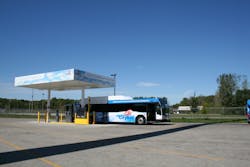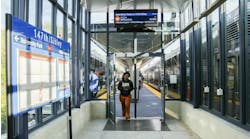When the Great Recession hit in 2008, The Greater Lafayette Public Transportation Corp. (CityBus) in Lafayette, Indiana, found itself looking at ways to reduce costs.
Marty Sennett, general manager of CityBus, said agency staff scoured different areas of the budget to find ways to cut costs. When they crunched the numbers, the two biggest areas the agency could save money were insurance costs and fuel.
“When you look at cutting costs, if you reduce the number of cell phones from 10 to eight, you’re saving a couple hundred dollars a month,” Sennett said. “But, if you could cut your fuel costs in half, that’s some real significant savings.”
Alternative fuel fleets are growing in North America, so CityBus leaders decided it was time to join the trend and push its fleet from diesel to compressed natural gas (CNG).
Looking at Options
CityBus looked at different options to cutting fuel costs, such as hybrid buses, but Sennett said when the hybrid units go bad it costs thousands to fix it. Cleaner burning fuel also meant CityBus didn’t have to purchase DEF or worry about catalytic convertors, which are still in place on hybrid buses.
“With the hybrids, you still have this huge convertor and you have to take it out every six months and have it cleaned,” he said.
Sennett said the price of a CNG bus also is appealing because it costs about $40,000 more than a standard diesel bus, while a hybrid bus cost about $200,000 more than a standard diesel unit. The lower cost per unit allowed CityBus more flexibility in the federal funding it received to purchase buses.
Sennett said the state of Indiana has a program where if a fleet can show a reduction in energy savings, the energy savings project can be financed using the savings accrued. CityBus used those savings to build a CNG refueling station. Federal funds were used to make improvements and safety changes to the bus garage and maintenance facilities required when using a natural gas fleet.
The fueling station costs about $3 million, which is being fully funded by CityBus. The Garage improvements were about $730,000.
“You know, from a local level, you certainly want to make sure you include the local fire marshall and fire department in every step along the way with the NFPA ruling guidelines in these stations,” said George Turner, manager of maintenance for CityBus. “There’s a lot of language in there for interpretation, but we have a community that fully embraced it and has been working with us.”
The CNG fueling station opened in April and Sennett said six full size buses and four paratransit units were put into service. Another six CNG Gillig buses will arrive in December. CityBus is getting some New Flyer CNG buses as well.
He said CityBus isn’t going to change out engines and put in CNG kits on current diesel buses because it’s not cost effective. The diesels will just be phased out over time.
Since going into service, Sennett said he’s surprised how quiet the buses are.
“The engine is even quieter than the hybrids with the smaller ISB Cummins on it,” he said.
Michael Hosfeld, Midwest sales director, TruStar Energy, said smaller transit fleets need to determine fuel consumption on an annual basis when making the change to CNG.
“It's very common for fleets of all sizes to start with 10 or 12 vehicles with a goal to replace the rest of the fleet over a multi-year period based on available funds,” he said. “Fleets with less than 10 trucks would find it more challenging to make their own station pencil out and would likely best be served by utilizing a public CNG station.”
Some agencies have looked at selling CNG fuel to the public to recoup costs, but Sennett said that’s not a good option for CityBus. The agency is located on 5 acres of property about five miles off I-65, so it would take tractor trailers 20 minutes to get there after exiting. There is little demand for CNG from the private sector in Lafayette and Sennett said they wouldn’t want local people refueling private vehicles in an active bus refueling area due to safety concerns.
“Another thing properties considering working with or providing a public refueling site is that many of the conversions today work off a 3,600 PSI rating while the older conversions were designed for 3,000 PSI,” Turner said. “There’s standardization of the nozzle to fill the tanks and the older conversions had a different type of fitting and you can damage the nozzles.”
Preparing for changes
Hosfeld said when considering a switch to CNG, step one is confirm with the gas utility that they have gas supply readily available at the desired location. Once confirmed the rest of the items are similar to any construction project.
A local agency or government should also consider talking to several friends who have already made the switch and visiting their CNG station sites in person. Then reach out to key component suppliers such as Cummins engine and their preferred bus manufacturer to learn about the CNG tank packages as well as meeting with turn key CCNG station builders that provide great information with a fee.
"Speaking to a few key transits that already switched, meeting with key suppliers and turn key station builders will be a solid foundation to move to the next step,” Hosfeld said. “That may be a consultant, a standard bid process, or performance contracting to move forward.
“For the CityBus project we had a fantastic local partner, Energy Systems Group out of Indianapolis. ESG is known for managing large energy saving projects such as refitting buildings for energy efficiency, installation of geothermal, solar, heating and cooling system upgrades, insulation and water and waste treatment facilities, etc. They manage government projects like this from start to finish.”
There were lots of things for CityBus to consider when making the change to CNG, but Hosfeld said climate wasn’t one of them.
“There are no special considerations for Midwest climates,” Hosfeld said. “ CNG vehicles operate from Minnesota to Texas and have a reputation for superior cold start over diesel.”
George Turner, manager of maintenance for CityBus, said changes in maintenance haven’t had to change much with the conversion other than preventative maintenance procedures such as spark plug ignition maintenance and valve adjustments. The agency also ran an aggressive oil analysis program before the change took place.
“With the CNG buses, the filters for the high and lower are a little more expensive than for the diesel applications, but the tradeoff is that certainly the business model is more cost effective not having the advance turbocharging systems and things like that,” he said.
Hosfeld said start preparing the overall agency by informing the entire team about the project, such as the why/ overall project goals, where construction will take place, what each employees key role will be today and upon implementation and the time line of the project.
Turner said mechanics weren’t receptive to the CNG buses at first because it has spark plugs and therefore wasn’t considered a true heavy-duty vehicle in their viewpoint. However, once the units were delivered, they quickly got rave reviews from operators, and then mechanics learned it wasn’t so bad.
“During the whole process, we kept the maintenance department in the loop,” he said.
One of the issues CityBus hasn’t thought of during the conversion, Turner said, was that if the CNG commercial vehicles are involved with what’s considered a DOT-type accident, then the CNG system has to be inspected by a qualified inspector.
“We didn’t have that and unfortunately we had an accident not too long after we got the buses,” he said. “But the good news is it wasn’t our fault, when it came to getting the bus inspected, there was no one locally that was authorized, so we sent one technician out and got him certified.”
Sennett said the company hired to do the inspection costs $600 per bus, so training the technician pays for itself.
“We would have to pay $600 every time that happened,” he said. “That training cost $1,000 and it was in the Chicago area, so for less than $1,500 we got a guy certified.
“So, 2.5 to three accidents and that’s paid for.”
Hosfeld said Construction projects on an active operational site pose challenges such as keeping people safe, maintaining traffic flow and following a tight schedule.
“CityBus was more than helpful and cooperative before, during and after the project which is key to meeting their operational expectations,” he said. “Whether the transportation is for people, packages or garbage we ensure our clients complete their projects with minimal operational disruption. From our perspective the project was rather typical to what we do on a day to day basis.
The only nagging issue CityBus dealt with on the CNG conversion was with the refueling system. Using the Angi system, Sennett said it’s a two compressor system and it kept shutting down. It didn’t keep the buses from refueling, he said, but it was a problem that took about two months to resolve after some adjustments were made to the system.
Savings on fueling costs are not dramatic yet, Sennett said, but going to natural gas allows for a more stable fuel price outlook as the cost is regulated by the state as opposed to oil cartels.
“People ask me ‘are you sorry you went to CNG when diesel costs are so low,’” Sennett said. “The answer is absolutely not because I think that the cost of diesel will increase again. I don’t know when, but it can’t stay this low for long.”

Joe Petrie | Associate Editor
I came to Mass Transit in 2013 after spending seven years on the daily newsbeat in southeastern Wisconsin.
Based in Milwaukee, I worked as a daily newspaper reporter with the Waukesha Freeman from 2006-2011, where I covered education, county and state government. I went on to cover courts for Patch.com, where I was the main courts reporter in the Metro Milwaukee cluster of websites.
I’ve won multiple awards during the course of my career and have covered some of the biggest political events in the past decade and have appeared on national programs.
Having covered local government and social issues, I discovered the importance of transit and the impact it can have on communities when implemented, supported and funded.






